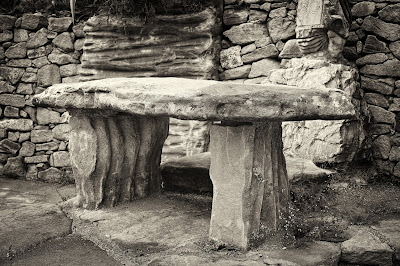In what has become (allegedly) one of the cheesiest and
trite Christian slogans to adorn bumper stickers and T-shirts everywhere, “let
go and let God” has, sadly, fallen on hard times. Why? Some
would argue it’s overly simplistic, perhaps too easily applied. It is, in fact,
often used to cut short someone’s litany of trials and tribulations. Sometimes the use of such cliches can become our
default or alternative to actually
listening to someone intently and empathizing with them. Phrases like “let go and let God” can feel
like we’re simply applying a “one size fits all” band aid to really complex
issues and problems.
But I say this phrase has fallen on hard times sadly because there is, indeed, a
time for releasing an effort—an
expectation, to God. It is at the point
where we have done what was ours to
do and now we must “let go (of the outcome) and let God (do His thing). We are
at that juncture with our Christmas preparations. Truth is, the pressure’s off. Not for you or me to do any less than our
very best. But as it relates to any lives
being changed or people coming to Christ next weekend, that’s really up to
Him. What has already occurred, though,
is the transformation in us as we
have been on this journey together.
Even before the first light comes up or the first note is sung of Convergence,
I am convinced that the work of God has
already been displayed among us in our preparation of this amazing
event.
I have said it before, and I believe it is worth
repeating. Jesus did not invade our
planet over 2000 years ago so that we could do cool programs once a year. What He did do was to restore our
relationship with ‘Papa’ God, so that the act of worship would not be done
couched in fear and shame. His coming to
us in human form satisfied once and for all our desire to touch and kiss the
face of God. As Spirit-filled believers,
we now can do that anytime, anywhere.
Even in front of our friends and neighbors who may not know Him
personally…yet.
My prayer as we enter this demanding week of rehearsals and
‘performances’ is three-fold:
- that each of you will know how deeply loved and valued you are, and how profound is the privilege God has given you to carry on the work of that first angelic chorus on the hillside outside Bethlehem.
- that like those first good-news bearers, you will relax in the knowledge that your role as seen planters is fulfilled. Others may add water and nourishment to that sowing in the future, but it will be God alone who provides the growth.
- that the friends and acquaintances whom you have invited will get a glimpse of just how much you love your Savior, not just singing. In other words, be free to worship Him!
May these days mark your lives and create memories for years
to come. Savor each and every
moment. Thanks to each of you—especially
those of you joining us for this special season—from the bottom of my heart for
saying ‘yes’ to the call. With the
apostle Paul, I say:
I thank my God every time I remember you.
In all my prayers for all of you, always pray with joy
In all my prayers for all of you, always pray with joy
because of your partnership in the
gospel from the first day until now,
being confident of this,
being confident of this,
that he who began
a good work in you will carry it on to completion
until the day of Christ Jesus.
until the day of Christ Jesus.
Finally, I say to all you perfectionists, “let go” may just
be the hardest thing you will ever hear, because it involves loss of
control. And for any potential slackers,
who resist discipline and love “just waiting on the Lord” (which often
translates into “The Lord waiting on you…”), I challenge you to not “let go”
prematurely. Do your due diligence, come
prepared, and THEN rest in God. But sooner or later, team, it’s time to LET GO.
Let’s do it!
tad










